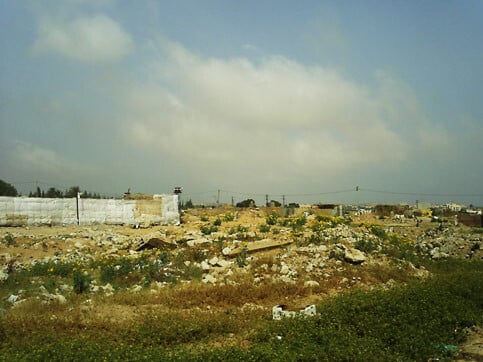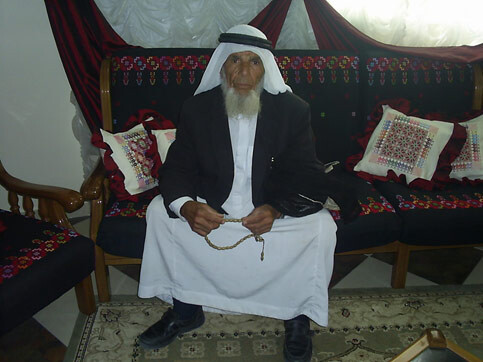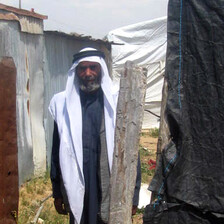Gaza Strip 21 May 2008

Another Nakba: the rubble of Marwan Ali Shaath’s house in Rafah, Gaza. (Rami Almeghari)
At the southernmost area of the Gaza Strip, where the Philadelphia route separates the coastal enclave from Egypt, there are scores of knocked down buildings. The destruction dates back to 2002, when Israeli army bulldozers demolished the houses of the Palestinian inhabitants of this border line.
Among the houses that used to stand here was that of Ali Shaath, a 75-year-old Palestinian refugee from the Beer al-Saba’ village of historical Palestine, the current site of the Israeli town of Beer Sheva.
Ali’s 39-year-old son, Marwan Ali Shaath, relayed the story of what he called “a Nakba [catastrophe] of my own, other than that my father had endured in 1948.”
“Lucky me, my father lived two Nakbas, but I only lived one, maybe because I am younger. Or maybe I will be forced to live one more Nakba, who knows,” said Marwan satirically.
“Our family house was placed exactly here before it was knocked down in 2002 by the Israeli army bulldozers,” Marwan said, pointing at the ruins of a two-story building, home to all members of Ali’s family.
Marwan recalls that the Philadelphia route used to include many beautiful houses and some villas which many foreign delegations, including journalists and tourists, used to come and visit prior to the outbreak of the Palestinian intifada or uprising in 2000.
“It was a Nakba, can you imagine, we used to flee in the middle of the night, seeking shelter in She’out locality, just nearby, where our old refugee house was located. Almost every night, Israeli gunshots penetrated the walls and windows of our house and other houses there on the Philadelphia route, until the Israeli bulldozers eventually totally displaced us from the area,” Marwan recalled.
Marwan is one of four sons of Ali Sha’at, whose first displacement came under the fire of Jewish militias who forced him from his original Bedouin town in southern Palestine. In 1948, when the state of Israel was established on historic Palestine, the land was ethnically cleansed of 750,000 of its indigenous inhabitants who ended up in refugee camps in the West Bank, Gaza Strip, Lebanon, Syria and Jordan. According to the UN agency for Palestine refugees, UNRWA, there are now approximately more than 4.5 million registered refugees in those same areas.
Marwan now lives in a newly-established internationally-funded neighborhood of Badr refugee camp on the outskirts of Rafah City in the southern Gaza Strip.
“What I really want to say is that I don’t want to be forced one day to pass down to my three little daughters one more Nakba the way my father was forced to pass down [the original Nakba] to his children, including myself,” Marwan said while standing on what remains of his battered house near the Gaza-Egypt border line.
In the first few years of the intifada, Human Rights Watch found in a 2004 report called “Razing Rafah: Mass Home Demolitions in the Gaza Strip” that Israeli forces demolished over 2,500 homes in the Gaza Strip, two-thirds of them in Rafah. Ten percent of Rafah’s population — most of them refugees — lost their homes and were dispossessed for a second or third time. The mass home demolitions are a long-standing Israeli policy; the same report stated “In the summer of 1971, the IDF destroyed approximately 2,000 homes in the refugee camps of the Gaza Strip, including Rafah.”

Rezeq Abu Taialakh (Rami Almeghari)
The story of 77-year-old refugee Rezeq Abu Taialakh, a neighbor of Marwan at the Badr refugee camp, demonstrates that the Palestinian story is one of constant dispossession. “I shot back at the Jewish armed groups in Beer al-Saba’ while I was only 18 years old. Since 1948, up to this moment, we have been forced to move from a place to another, from Beer al-Saba’ to Khan Younis refugee camp, to Abbassan, to Rafah and [within] Rafah again.”
Rezeq added, “We have suffered quite a lot in this life, moving from one refuge to another. We ask God to relieve us and take our rights back from such repressors.”
However, as Palestinians young and old cope with the ongoing Nakba, in the Gaza Strip such relief seems far off as Israeli media report that the Israeli army is ready to carry out a massive military offensive in the Strip to stamp out the Palestinian resistance. Israel acknowledging the Palestinians’ right to return, enshrined in international law and upheld by numerous UN resolutions, seems as far off as ever.
“As you see, my brother, I am wrapping my tent. Maybe I or my children might need it one day,” said Marwan.
Rami Almeghari is currently contributor to several media outlets including the Palestine Chronicle, IMEMC, The Electronic Intifada and Free Speech Radio News. Rami is also a former senior English translator at and editor in chief of the international press center of the Gaza-based Palestinian Information Service. He can be contacted at rami_almeghari at hotmail.com.





